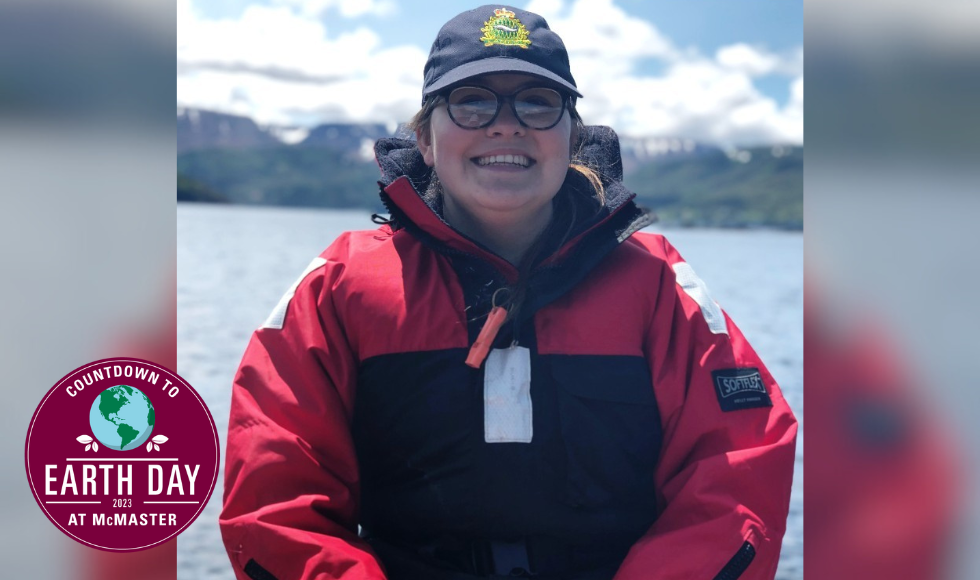Science champion wins GradFlix competition

Emily Robson is the winner of this year’s GradFlix competition for her one-minute video on the amount of microplastics in freshwater mussels collected from the Grand River.
Professor Karen Kidd isn’t surprised Emily Robson won this year’s GradFlix Challenge.
Robson, a graduate student in the Department of Biology and a member of Kidd’s lab, won the competition with a 60-second video explaining her research on the amount of microplastics found in freshwater mussels collected from Ontario’s Grand River.
The annual video competition is run by McMaster’s School of Graduate Studies and open to all graduate students from across the university.
“Emily’s incredibly passionate about freshwater mussels and it really shows in her video,” says Kidd, the Stephen A. Jarislowsky Chair in Environment and Health. “Emily can talk for hours — and will readily admit this — about these fascinating animals and has many facts, stories, and insights to share about why they need our attention.
“Fitting all that enthusiasm into a one-minute video is an award-winning feat on its own,” says Kidd.
Explaining her research in 60 seconds was a definite challenge, admits Robson. “But it was even harder figuring out how to communicate with an audience in an engaging way, especially without much time to give background information. I’m lucky that most people already know about microplastics. This let me spend more time introducing freshwater mussels and making them the ‘damsel in distress’ that I’m trying to help through my research.”
Why the interest in mussels? It started with the Department of Fisheries and Oceans’ species-at-risk team. Robson spent two summers monitoring mussel populations across southern Ontario.
“Although mussels might not look like very sophisticated animals, they have a really complex and fascinating life history that we still don’t fully understand.”
And why should we care about the fate of freshwater mussels?
“They’re important for maintaining a healthy watershed and ecosystem,” says Robson.
Some species can filter up to 50 litres of water a day, which improves water quality for other animals.
“We tend to find mussels only in areas of good water quality so changes to the mussel population can be an early warning sign for decreased water quality due to pollution. We’re still early in our research on how microplastics affect mussels. This research will definitely give us a lot more insights into what happens to the plastics in our water and where they end up.”
Communicating the benefits of science
A fellow graduate student introduced Robson to the GradFlix competition last year. She watched the live showcase and was hooked.
“I kept the competition in the back of my mind as a creative and new way to share my research.”
Robson estimates she spent upwards of 20 hours on the 60-second video. She started filming clips during her field season on the Grand River last August.
She then met one-on-one with a communications coach and sat in on storytelling workshops and feedback sessions offered by the School of Graduate Studies at the start of 2023, all of which helped Robson refine her script and create a storyboard for her video.
With the competition deadline fast approaching, Emily spent the final weekends refilming clips and audio and putting together the final cut.
Competitions like GradFlix help graduate students hone their communication skills, something that Robson says is absolutely essential for all researchers.
Communication and community engagement is also a strategic priority for the Faculty of Science. Workshops, courses and special events help undergraduate and graduate students, postdoctoral fellows and faculty gain the skills and confidence to take on leadership roles as science champions.
“Our research has the greatest impact when we communicate our science beyond academic journals and conferences and reach general audiences through public and social media. Effective and engaging communication is especially important in the field of microplastics because it’s a serious threat to freshwater mussels and other vulnerable aquatic species,” says Robson.
“Through communication, we also engage and inspire future generations and show how science and research benefits everyone in our day-to-day lives.”
Read more about the annual GradFlix competition here


